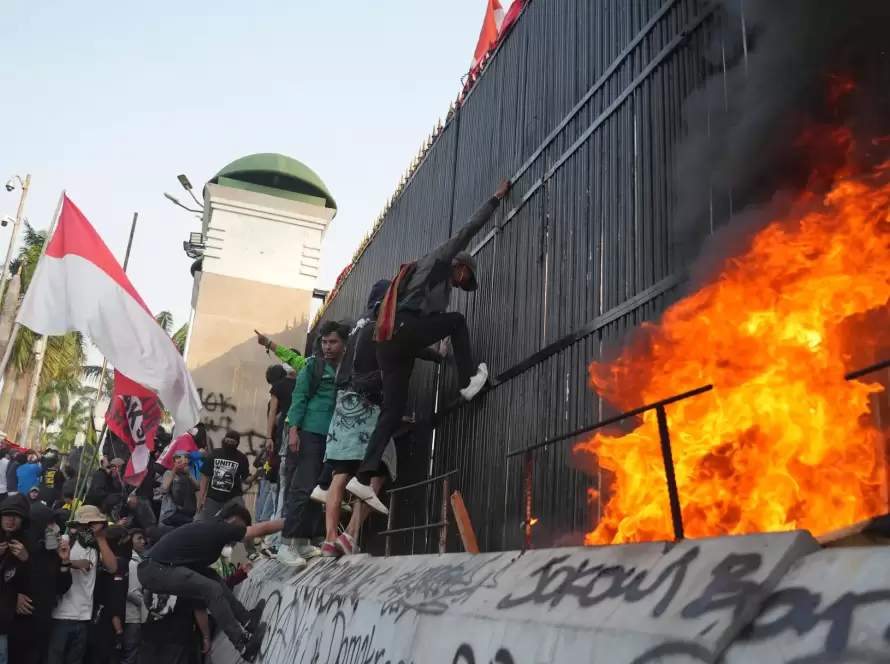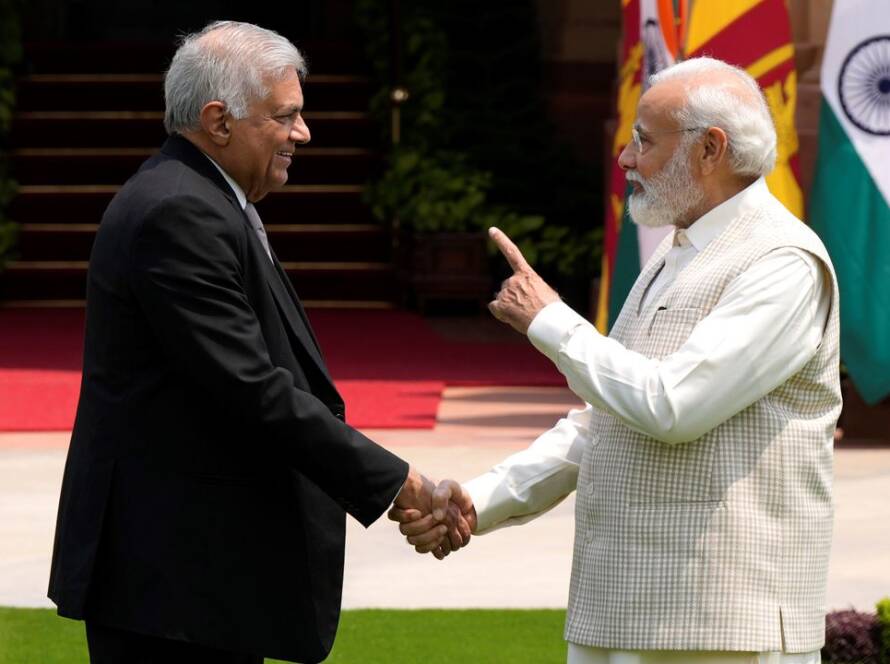By Deshani Samaragunarathna
The year 2024 has been one marked by global tumult, with the world seemingly lurching from one crisis to another.
From the Ukrainian frontlines to the simmering Middle East, to the escalating conflicts across Africa, and the erosion of liberal democracies in the West, the international system appears on the verge of collapse. The once stable world order dominated by a US-led liberal economic system is under attack from both internal and external forces, giving rise to a new form of global chaos.
Geopolitical Chaos: The War in Ukraine and the US-China Confrontation
At the heart of global instability lies the ongoing war in Ukraine, which has now entered its third year. Russia’s ambitions under President Vladimir Putin have reignited a devastating war on European soil, marking the largest conflict in the region since World War II.
Ukraine’s desperate fight for survival, supported by Western military and economic aid, has entrenched the world in a tense standoff between Russia and NATO powers, especially the United States. The war has not only shattered the European security architecture but has also deepened the ideological divide between democratic and autocratic regimes.
While the war in Ukraine dominates European geopolitics, the larger strategic confrontation between the United States and China is rapidly reshaping global politics. In 2024, tensions between the two superpowers escalated in the South China Sea, Taiwan, and global technology competition, particularly in areas like semiconductors and artificial intelligence.
The US continues to push back against China’s growing influence through protectionist trade policies and technological decoupling, while Beijing counters with its own set of economic and military maneuvers, including increased support for autocratic regimes and aggressive military posturing.
The strategic rivalry between the US and China has shifted the focus of global geopolitics towards Asia, while Europe finds itself torn between its transatlantic obligations and its growing reliance on Chinese trade. The increasingly unpredictable nature of international system, characterized by the rise of populism and authoritarianism, has led to a scenario where old alliances are weakening, and new, uncertain alignments are emerging.
Middle East Tensions: Israel, Gaza, and the Fragile Regional Order
In the Middle East, 2024 was marked by heightened tensions between Israel and the Gaza Strip, following a deadly flare-up in October 2023.
The Israeli-Palestinian conflict, long a source of instability in the region, has once again triggered violence that threatens to spiral out of control. Gaza’s Hamas government, along with other factions, has engaged in repeated clashes with Israeli forces, drawing in regional players like Iran and Lebanon’s Hezbollah. As of 2024, the Middle East finds itself teetering on the edge of another major regional conflict, with the potential for a wider conflagration involving Saudi Arabia, Syria, and even Iraq.
Syria, following the Bashar al-Assad overthrow, thousands of Syrians have spontaneously returned to the country from Lebanon and Türkiye, while others have fled in the other direction. Millions of Syrian refugees are following developments in their country closely to assess whether the transition of power will be a peaceful one that respects their rights and allows for a safe return.
Africa’s Escalating Crises: From Sudan to the Sahel
Africa in 2024 witnessed the spread of conflicts from Sudan to the Sahel, threatening to engulf the entire continent in violence. The civil war in Sudan, which erupted in April 2023 between the Sudanese Armed Forces and the Rapid Support Forces, showed no signs of abating in 2024.
The humanitarian toll has been catastrophic, with millions of civilians displaced and regions of Sudan descending into anarchy. This has resulted in a massive refugee crisis, not only within Africa but across the Mediterranean into Europe.
In the Sahel region, jihadist violence continues to spread, with insurgencies in Mali, Burkina Faso, and Niger destabilizing vast swathes of West Africa. As local governments struggle to contain the violence, French and US forces are increasingly being pushed out of the region by military-led governments, signaling the erosion of Western influence. As jihadist militants spread south toward coastal nations like Ghana and Côte d’Ivoire, the risks of a larger regional conflict loom large.
Meanwhile, in Central Africa, tensions between Rwanda and the Democratic Republic of the Congo (DRC) have intensified, with M23 rebels widely considered to be a Rwanda proxy clashing with DRC forces. The situation is further complicated by the role of disinformation, which plays a significant role in heightening ethnic violence across the region. In Ethiopia and the Central African Republic, for example, hate-filled content spread through social media platforms like Facebook has exacerbated ongoing conflicts.
India’s Rising Influence in a Fragmented World
In this context of global turmoil, India’s role has become increasingly significant. As the world’s largest democracy and a rising economic and military power, India has maintained a unique position.
On the one hand, it has strengthened its defense and economic ties with the US, Japan, and Australia, especially through the Quad alliance, which focuses on regional security in the Indo-Pacific. On the other hand, India’s strategic autonomy allows it to engage with Russia, notably through energy imports and defense deals, while carefully navigating tensions with China over their shared border.
India’s growing influence in global affairs positions it as a potential leader in advocating for a rules-based international order, yet it faces the challenge of balancing its domestic priorities with its international aspirations. Its foreign policy, while pragmatic, has at times been criticized for hesitating to fully embrace the Western vision of liberal democracy, particularly as concerns over human rights and freedom of expression within its borders continue to rise.
The Rise of Populism and Autocracy: Liberal Democracies Under Siege
One of the most alarming trends in 2024 is the growing erosion of liberal democracies across the world. From the United States to Hungary, from Brazil to the Philippines, populist leaders with authoritarian tendencies have undermined democratic institutions and norms.
President-elect Donald Trump’s return to political prominence in the US in 2024, along with his embrace of protectionism, isolationism, and social media-driven propaganda, illustrates the rise of what could be described as “chaos politics.”
His unpredictability exemplified by his controversial statements, tweets, and disregard for traditional diplomatic protocols has resonated with a portion of the electorate disillusioned by the failures of traditional political elites. But his approach also undermines the liberal international order that has shaped global governance since World War II.
The global rise of autocrats has further destabilized the rules-based international order. These leaders, often using nationalism as a rallying cry, have sought to consolidate power at home while aggressively challenging the Western-dominated international system abroad. Putin’s war in Ukraine and Xi’s aggressive policies toward Taiwan and Hong Kong have demonstrated that autocracies are willing to challenge the West for global dominance.
Meanwhile, North Korea, under Kim Jong-un, has conducted several nuclear tests in 2024, raising concerns about the destabilizing effects of nuclear proliferation. The Chinese government, although a supporter of North Korea, has kept its distance, showing the complex geopolitical dynamics at play. The increasing coordination between autocratic states, while destabilizing in the short term, could eventually lead to a reordering of the global power structure.
The End of Liberal Democracy? A New World Order?
As populism, authoritarianism, and geopolitics clash, the question arises: Is this the end of liberal democracies? The rise of autocrats, along with the fragmentation of the international system, suggests that liberal democracy is under threat.
The internal challenges faced by liberal democracies, including economic inequality, social unrest, and disillusionment with political elites, have paved the way for populist movements that reject the established order. These populists, often willing to abandon democratic norms, rely on divisive rhetoric and nationalism to consolidate power.
However, it is important to recognize that the erosion of liberal democracy does not necessarily equate to its collapse. While authoritarian regimes appear to be gaining ground, liberal democratic values continue to inspire mass movements for political freedom and human rights.
In countries like Hong Kong, Myanmar, and Belarus, pro-democracy protests have demonstrated the enduring desire for democratic governance. Yet, these movements remain under siege by autocratic regimes that are willing to use force and repression to maintain control.
Looking Ahead: The Future of Global Order
As we look to the future, the world finds itself at a crossroads. The chaos of 2024 reveals deep fractures in the international system, but it also provides an opportunity for introspection and reform. Global powers must decide whether to cling to an increasingly untenable liberal world order or adapt to a new geopolitical reality defined by multipolarity and competing ideologies.
In this new world order, where chaos reigns and the lines between peace and war blur, it is crucial for liberal democracies to reassess their strategies. Will they retreat into isolationism, as some advocates of populism suggest, or will they strengthen international institutions to better address the challenges of the 21st century? The answer will determine whether liberal democracies can survive in an increasingly chaotic world or whether the global order will fall into irreparable fragmentation.
In conclusion, 2024 has been a year of unprecedented global upheaval, marked by escalating conflicts, the rise of authoritarian regimes, and the erosion of liberal democratic values. The chaos that defines the new world order challenges traditional conceptions of power and governance.
Whether this chaos will lead to the collapse of liberal democracy or the rise of a new, more unstable global system remains to be seen. What is clear, however, is that the world is at a pivotal moment—one that will define the future of geopolitics and global order for years to come.
Deshani Dewmini Samaragunarathna graduated with a Bachelor of Science (BSc) in Strategic Studies and International Relations from the Faculty of Defense and Strategic Studies at the General Sir John Kotelawala Defence University. In 2022, She represented Sri Lanka as a Global UGRAD Scholar at the University of Alabama in the US. Geopolitics, history, public diplomacy, and soft power are among her research interests.
Factum is an Asia-Pacific focused think tank on International Relations, Tech Cooperation, Strategic Communications, and Climate Outreach accessible via www.factum.lk.
The views expressed here are the author’s own and do not necessarily reflect the organization’s.


